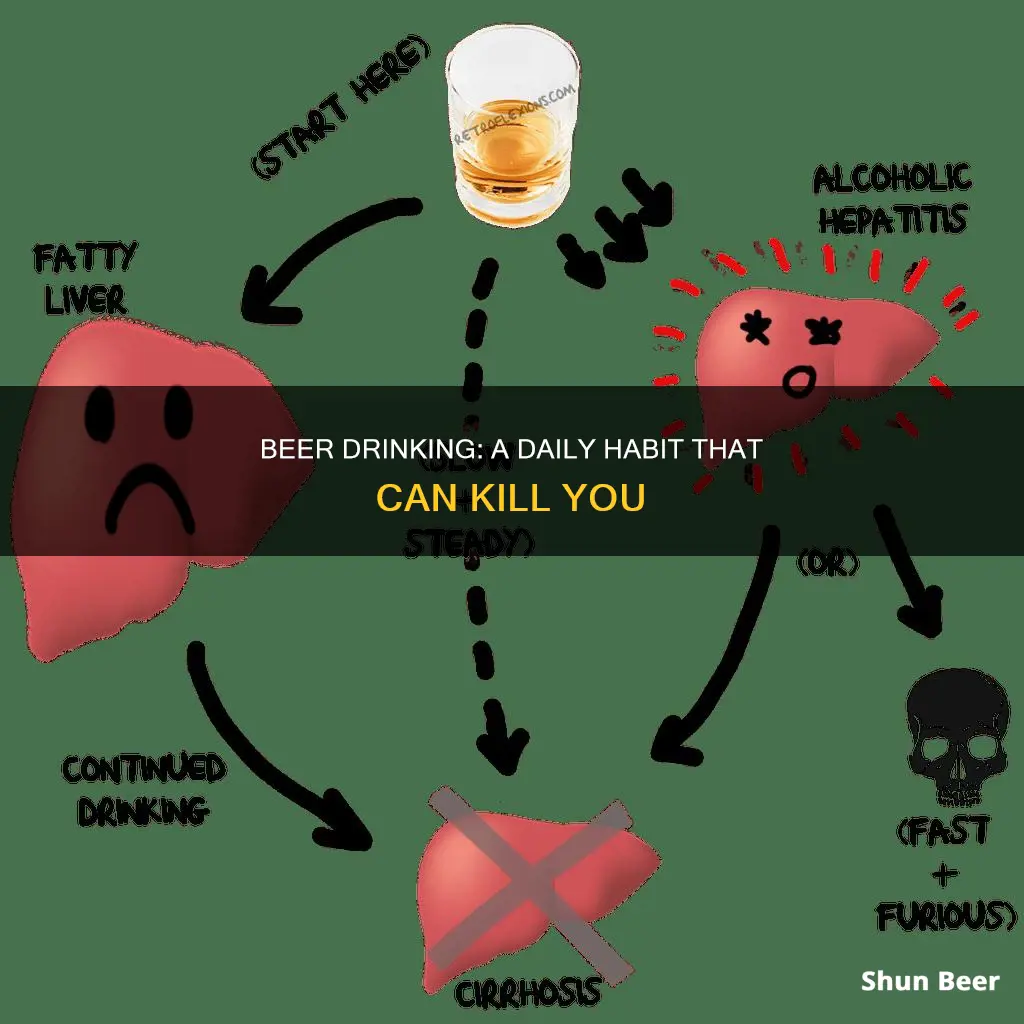
Drinking beer every day can have a range of effects on the body and mind, and in extreme cases, it can even be lethal. The impact of daily beer consumption depends on various factors, including the amount consumed, frequency, and individual health. While moderate drinking may offer some health benefits, excessive intake can lead to serious negative consequences.
Short-term effects of daily beer consumption include disruptions to blood sugar levels, dehydration, electrolyte imbalances, impaired sleep, and mental health issues such as an increased risk of depression and anxiety. Additionally, beer's high-calorie content can contribute to weight gain and obesity.
Long-term health consequences of daily beer consumption are more severe and include liver damage, inflammation, and scarring, which can progress to serious conditions like cirrhosis and liver cancer. Excessive drinking also increases the risk of cardiovascular diseases, such as high blood pressure, heart failure, and stroke, and certain types of cancer, including liver, breast, colon, and oesophageal cancer.
It is important to note that no amount of alcohol consumption is completely safe, and even one beer can have mind-altering effects. Binge drinking and alcohol dependence can further increase the risk of accidental death, with approximately six people dying daily from alcohol poisoning in the United States. Therefore, it is crucial to drink responsibly and in moderation to maintain good health.
What You'll Learn
- Beer can cause dehydration and put a strain on the kidneys
- Excessive drinking can lead to liver damage and increase the risk of heart disease
- Drinking beer every day can disrupt sleep patterns and increase the risk of depression and anxiety
- Beer consumption can lead to gastrointestinal inflammation, causing digestive issues such as bloating, gas and diarrhoea
- Drinking beer every day increases the risk of certain types of cancer

Beer can cause dehydration and put a strain on the kidneys
Beer is a drink made by fermenting sugars from starches. Its major components are barley, hops, water, and yeast. Beer can be alcoholic or non-alcoholic. Typical American alcoholic beers average 4% to 5% alcohol (ethanol) by volume, but some can be much higher.
Drinking beer every day can have a toll on your overall health, both immediate and long-term. While drinking beer in moderation may have some health benefits, such as increased bone density, improved gut health, and better lipid levels, excessive drinking can lead to serious health problems.
One of the immediate effects of drinking beer is dehydration. Alcohol is a diuretic, which means it increases the production of urine. This can lead to a loss of fluids and electrolytes, causing dehydration. Dehydration can further strain the kidneys, as they work to regulate fluid balance and filter waste products from the blood.
When you drink beer, the alcohol is metabolized by the liver. Excessive alcohol consumption can lead to liver damage, including conditions such as fatty liver disease. The toxins in alcohol can also affect the kidneys, disrupting hormones that regulate kidney function. This can further exacerbate dehydration and put additional strain on the kidneys.
To minimize the risk of dehydration and reduce the strain on the kidneys, it is important to drink beer in moderation and ensure adequate water intake. It is generally recommended to limit alcohol consumption to no more than two drinks per day for men and one drink per day for women.
Breastfeeding and Beer: What's Safe?
You may want to see also

Excessive drinking can lead to liver damage and increase the risk of heart disease
ARLD has three main stages, although there is often an overlap between each stage. The first stage is alcoholic fatty liver disease, which is characterised by a build-up of fats in the liver. This can occur after just a few days of heavy drinking and is an important warning sign that an individual is drinking at a harmful level. Fatty liver disease rarely causes any symptoms, and it is reversible if the individual stops drinking alcohol for at least two weeks.
The second stage is alcoholic hepatitis, which is unrelated to infectious hepatitis. Alcoholic hepatitis can be caused by alcohol misuse over a longer period, or it can occur after a large amount of alcohol is consumed in a short period of time (binge drinking). The liver damage associated with mild alcoholic hepatitis is usually reversible if the individual stops drinking permanently. However, severe alcoholic hepatitis is a serious and life-threatening illness that claims many lives each year.
The third stage of ARLD is cirrhosis, where the liver has become significantly scarred. Cirrhosis is generally not reversible, but stopping drinking alcohol immediately can prevent further damage and significantly increase life expectancy. If an individual with alcohol-related cirrhosis does not stop drinking, they have a less than 50% chance of living for at least five more years.
In addition to liver damage, excessive drinking can also increase the risk of heart disease. While moderate alcohol consumption has been linked to a reduced risk of developing heart disease, excessive drinking can lead to high blood pressure, stroke, heart failure, and cardiomyopathy. Cardiomyopathy is a disorder that affects the heart muscle and can be caused by vitamin deficiencies resulting from excessive alcohol consumption.
Beer After Work: Relax, Unwind, and Socialize
You may want to see also

Drinking beer every day can disrupt sleep patterns and increase the risk of depression and anxiety
Drinking beer every day can have a detrimental effect on your sleep patterns and your mental health. While alcohol is a central nervous system depressant and can make you feel relaxed and sleepy, it can also disrupt your sleep cycle and increase your risk of depression and anxiety.
Sleep Disruption
Alcohol affects your brain's communication pathways and its ability to process information. It can also slow down your reflexes and impair your balance, memory, and sleep. Even light alcohol consumption can disrupt your sleep. A 2018 study found that men and women who consumed two or fewer drinks (for men) or one or fewer (for women) experienced a 9.3% decrease in sleep quality.
When you drink, your body prioritises metabolising the alcohol over other functions. This can disrupt your sleep cycle, reducing the amount of time you spend in REM sleep and increasing the time you spend in slow-wave sleep. This can lead to more frequent wakings and fragmented, low-quality sleep.
Increased Risk of Depression and Anxiety
Heavy alcohol use can contribute to the development of insomnia, a sleep disorder characterised by difficulty falling and staying asleep. People with insomnia have an increased risk of developing alcohol use disorder, as they may turn to alcohol as a sleep aid. This can create a destructive pattern where individuals drink alcohol to fall asleep but then experience poor sleep, leading to excessive sleepiness during the day. To counteract this, they may rely on caffeine, which further disrupts their sleep.
Additionally, alcohol can interfere with circadian rhythms, the biological patterns that operate on a 24-hour clock. It may decrease the body's sensitivity to cues like daylight and darkness, which trigger shifts in body temperature and the secretion of melatonin. This can result in feeling alert when you want to sleep and sleepy when you want to be awake.
In conclusion, while drinking beer every day may not directly cause death, it can have significant negative impacts on your sleep patterns and mental health. It is important to consume alcohol in moderation and avoid drinking close to bedtime to minimise these harmful effects.
Beer and Yeast Infections: Is It Safe to Drink?
You may want to see also

Beer consumption can lead to gastrointestinal inflammation, causing digestive issues such as bloating, gas and diarrhoea
Beer is a popular alcoholic beverage worldwide, but drinking it every day can have adverse effects on your health. Beer consumption can lead to gastrointestinal inflammation, causing digestive issues such as bloating, gas and diarrhoea.
Beer is produced by fermenting starches from cereal grains like barley, wheat, maize, rice and oats. The fermentation process generates ethanol and carbonation, with most modern beers also containing hops for bitterness, flavour and preservation. While beer typically has a lower alcohol content than other alcoholic drinks, regular consumption can still negatively impact your health.
According to Kimberly Gomer M.S., RD, LDN, alcohol can irritate the small intestine and colon, affecting the normal speed of food movement through these organs. This can result in abdominal pain, bloating and diarrhoea. Furthermore, excessive alcohol intake can cause intestinal inflammation, leading to issues within the gastrointestinal tract and the liver.
A 2017 publication in 'Alcohol Research' highlights how alcohol can negatively alter gut bacteria and increase intestinal permeability (leaky gut syndrome), making individuals more susceptible to alcohol-related diseases, including alcoholic fatty liver disease. This disruption to the gut can have far-reaching consequences, potentially affecting the body's overall health.
Therefore, while beer may be a popular beverage for relaxation, it is important to consume it in moderation. The US Centers for Disease Control and Prevention (CDC) guidelines recommend limiting daily intake to two drinks or fewer for men and one drink or fewer for women.
Beer and Lipitor: Safe Mix or Health Risk?
You may want to see also

Drinking beer every day increases the risk of certain types of cancer
The federal government's Dietary Guidelines for Americans 2020-2025 recommend that individuals who do not drink alcohol should not start, and those who do drink should limit consumption to two drinks or less in a day for men and one drink or less in a day for women. Heavy drinking is defined as having four or more drinks on any day or eight or more drinks per week for women, and five or more drinks on any day or 15 or more drinks per week for men.
Drinking alcohol is linked to an increased risk of several cancers, with about 5.5% of all new cancer diagnoses and 5.8% of all cancer-related deaths attributed to alcohol consumption. Alcohol is a Group 1 carcinogen, the same ranking given to tobacco and solar radiation. While this does not mean that drinking is as harmful as smoking, it indicates a strong level of evidence that exposure can cause cancer.
Clear patterns have emerged between alcohol consumption and the development of specific types of cancer. These include:
- Head and neck cancer: Moderate to heavy alcohol consumption is associated with higher risks of oral cavity, pharynx (throat), and larynx (voice box) cancers.
- Esophageal cancer: Alcohol consumption, regardless of quantity, is associated with an increased risk of esophageal squamous cell carcinoma.
- Liver cancer: Heavy alcohol consumption is associated with approximately twice the risk of two types of liver cancer: hepatocellular carcinoma and intrahepatic cholangiocarcinoma.
- Breast cancer: Epidemiological studies consistently show an increased risk of breast cancer with increasing alcohol intake.
- Colorectal cancer: Moderate to heavy alcohol consumption is associated with 1.2 to 1.5 times the risk of cancers of the colon and rectum compared to non-drinkers.
Additionally, evidence suggests an association between alcohol consumption and increased risks of melanoma, prostate, and pancreatic cancers. While some studies indicate a decreased risk of kidney cancer and non-Hodgkin lymphoma with alcohol consumption, the potential benefits are likely outweighed by the harms.
The mechanisms by which alcohol increases cancer risk include:
- Metabolism of ethanol to acetaldehyde, a toxic chemical and probable human carcinogen, which damages DNA and proteins.
- Generation of reactive oxygen species, causing oxidative damage to DNA, proteins, and lipids in the body.
- Impairment of nutrient absorption, including vitamins A, B complex, C, D, E, K, and folate, as well as iron and selenium.
- Increased blood levels of estrogen, a sex hormone linked to breast cancer risk.
- Contamination of alcoholic beverages with carcinogenic substances introduced during fermentation and production, such as nitrosamines, asbestos fibers, phenols, and hydrocarbons.
UK Beer Laws: Drinking While Driving
You may want to see also
Frequently asked questions
Drinking beer every day can have several short-term effects on the body. Beer is a diuretic, which means it can increase urine production and lead to dehydration. It can also disrupt sleep patterns and cause fluctuations in energy levels and mood. Additionally, excessive beer consumption has been linked to an increased risk of depression and anxiety.
The liver is responsible for breaking down alcohol in the body. Drinking beer every day can lead to liver damage, inflammation, and scarring. It can increase the risk of developing alcoholic fatty liver disease, which can progress to more serious conditions such as cirrhosis and liver cancer.
Yes, beer is calorie-dense, and excess consumption can lead to weight gain, especially around the midsection. Beer contains empty calories and can lead to overconsumption of calories, contributing to weight gain over time.







